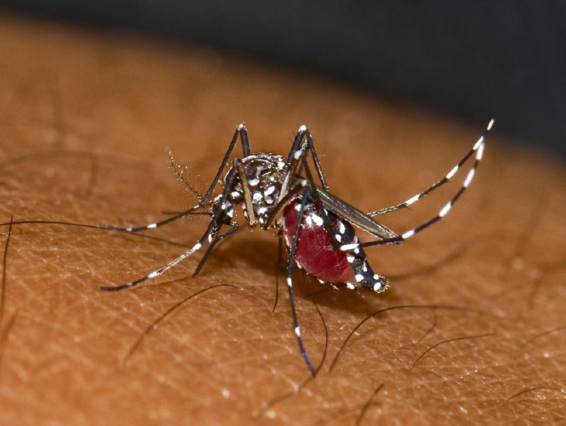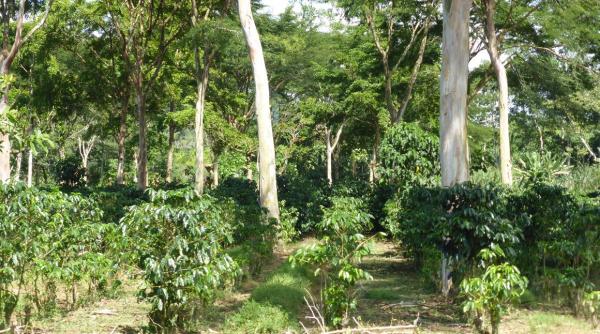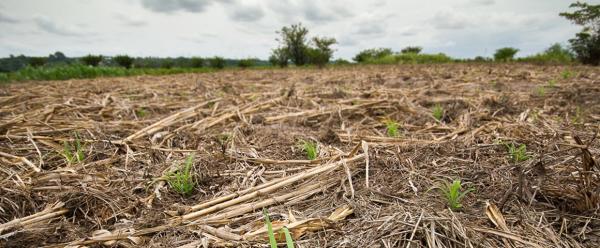Call to action 16 April 2025
- Home
- Press area
- Press releases
- reduced dengue fever monitoring by Covid mobilization
The Covid-19 pandemic must not overshadow mosquito control

Aedes albopictus, the tiger mosquito, is a dengue vector. More than 30 000 cases have been recorded in Réunion-Mayotte since 2017 © A. Franck, CIRAD
CovidSince the beginning of 2020, more than a million cases of dengue and around 400 deaths have been reported in Brazil. The Indian Ocean also has a dismal record, with major dengue epidemics in Mayotte and Réunion (more than 30 000 cases since 2017), as do the French West Indies (15 000 cases since late 2019). While the attention of health workers and populations is monopolised by the pandemic, vector-borne diseases, in other words those transmitted by arthropod vectors such as mosquitoes and ticks, continue to spread, whereas vector control is faltering. For dengue, the first symptoms of which are similar to those of Covid-19, this situation could lead to delays in diagnosis and specific patient care.
A slowdown in dengue surveillance and vector control operations
Lockdown measures around the world have resulted in the underreporting of cases of dengue in many regions. In the French overseas territories, reported cases fell drastically from the first weeks of lockdown, even though a marked increase in cases was recorded in the weeks leading up to it. This under-reporting has had a negative impact on epidemiological surveillance of dengue in these territories.
Moreover, vector control activities, in other words against mosquitoes, have also been affected by the pandemic.
“Many mosquito control operations in private homes could not go ahead because of lockdown in March and April ”, says Thierry Baldet, a medical entomologist at CIRAD and co-author of the article. “Consequently, there was insufficient regulation of mosquito populations over this period ”. In the context of this dual epidemic (dengue and Covid-19) in the French overseas territories and of the growing vector risk in summer in temperate climates (a case of autochthonous transmission of dengue was observed this summer in the Hérault department in France), ANSES mobilised a group of experts (whose work is available online ), chaired by Thierry Baldet.
The scientists thus call for better public awareness campaigns, especially on social networks. The goal is to strengthen social mobilisation against dengue and to improve vector control practices. These recommendations regarding good practices for mosquito control during the Covid-19 pandemic have been implemented in the French overseas territories and should be useful in the other parts of the world affected by dengue.
Dengue and Covid-19: a dangerous coexistence
In addition to the health, economic and social impacts of dengue epidemics, it appears that the first symptoms of dengue are very similar to those of Covid-19. Diagnostic errors, false positives or poor care: the health consequences for the countries in which both diseases are evolving simultaneously can be severe.
Although efforts to combat Covid-19 are necessary, the authors of the article stress that they should not overshadow the fight against dengue and other arboviral diseases spread by Aedes mosquitoes (Zika, chikungunya, yellow fever, etc.).
Innovative approaches in Aedes mosquito control CIRAD, through its research on vector-borne animal or zoonotic diseases, has acquired a solid expertise in arthropod vector control, as well as in modelling. Thanks to this knowledge, CIRAD’s teams are capable of developing innovative solutions for the control of urban Aedes mosquitoes (Ae. albopictus and Ae. aegypti), vectors of dengue, Zika virus and chikungunya. These approaches include modelling of mosquito population densities and the boosted sterile insect technique. In Réunion, scientists from CIRAD have provided the Agence de Santé Régionale (ARS - Regional Health Agency) with software to predict Aedes mosquito population densities. The software, AlboRun, creates maps of the island showing areas where mosquito densities are predicted to be high. This enables the operators concerned to more effectively target their mosquito control actions. The sterile insect technique, on the other hand, consists in releasing sterile male mosquitoes into the wild, which then compete with fertile male mosquitoes to mate with females. At CIRAD, researchers are working to improve this technique using a specific biocide that only impacts the eggs. According to estimations, this “boost” could reduce by more than 95% the total number of sterile males needed to control dengue epidemics. This development would drastically reduce the cost of vector control. |
Reference
Marie-Marie Olive, Thierry Baldet, James Devillers, Johanna Fite, Marie-Claire Paty, Christophe Paupy, Philippe Quénel, Elsa Quillery, Jocelyn Raude, Jean-Paul Stahl, Marie Thiann-Bo-Morel, David Roiz. 2020. The COVID-19 pandemic should not jeopardise dengue control. Plos NTD



























